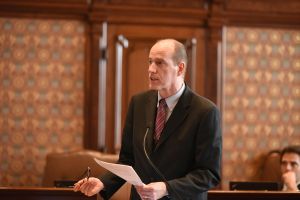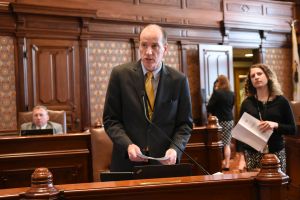- Details
- Category: Press Releases
 SPRINGFIELD— Senator Bill Cunningham passed legislation out of the Senate that would extend and expand the pilot program for the Accelerated Resolution Court or “Rocket Docket,” a program designed to quickly move minor offenses through the court system.
SPRINGFIELD— Senator Bill Cunningham passed legislation out of the Senate that would extend and expand the pilot program for the Accelerated Resolution Court or “Rocket Docket,” a program designed to quickly move minor offenses through the court system.
“The Rocket Docket legislation has proven to be a success in helping with overcrowding while ensuring that cases are resolved in a timely manner,” Cunningham said. “We don’t need those with traffic violations sitting in Cook County Jail only raising costs on tax payers.”
House Bill 6190 would extend the sunset date of the pilot program to June 30, 2019. This would allow for the new offenses that would be added to be utilized under this program. The new offenses that would be added would include traffic violations and some minor drug offenses.
- Details
- Category: Press Releases
 SPRINGFIELD—Hair dressers and nail technicians throughout Illinois soon will be trained to properly detect signs of domestic violence or sexual assault thanks to legislation being pushed by Senator Bill Cunningham in the Illinois Senate.
SPRINGFIELD—Hair dressers and nail technicians throughout Illinois soon will be trained to properly detect signs of domestic violence or sexual assault thanks to legislation being pushed by Senator Bill Cunningham in the Illinois Senate.
House Bill 4264 would require that cosmetologists, estheticians, nail technicians and hair braiders take a one-hour continuing education class about domestic violence and sexual assault awareness. The training will educate salon professionals about the signs of domestic violence or sexual assault as well as how to support and connect their clients with resources for help.
“When I met my wife she was working as a hair dresser to put herself through college and she would be witness to stories of abuse from clients, yet she would not know what steps to take,” Cunningham said. “Ensuring more people are aware of what sexual assault or domestic violence looks like and what steps they can take to help fight against it, we can stand up and protect victims.”
The legislation was introduced in the House by Representative Fran Hurley. It is an initiative of the Chicago Says No More movement.
“Our coalition is very grateful to Senator Cunningham and Representative Hurley for leading the way in a private-public alliance that will make it possible to responsibly assist a victim asking for help,” said Kristie Paskvan, founder, Chicago Says No More. “We also appreciate the collaboration of Cosmetologists Chicago as we prepared our curriculum which will be presented by professionals trained in addressing domestic violence or sexual assault.”
The legislation has passed the Senate and returns to the House for a final vote before going to the governor’s desk.
- Details
- Category: Press Releases
 SPRINGFIELD— Senator Bill Cunningham joined many of his colleagues in supporting Senate Bill 2059 to send needed money to state universities and colleges.
SPRINGFIELD— Senator Bill Cunningham joined many of his colleagues in supporting Senate Bill 2059 to send needed money to state universities and colleges.
The legislation would help schools like Chicago State University and Eastern Illinois University in ensuring they can continue to operate. It would also fund the first semester of MAP grants that many schools, including Saint Xavier University and Moraine Valley Community College, floated to students without any guarantee of the money coming through.
“Today, we took a vote to ensure that schools can continue to function and educate our students,” Cunningham said. “This is not enough, but it opens the door to continue to work in a bipartisan manner.”
The legislation now goes to the governor’s desk for his signature.
- Details
- Category: Press Releases
 SPRINGFIELD—Senator Bill Cunningham passed legislation out of the Illinois Senate prioritizing agriculture education in the state.
SPRINGFIELD—Senator Bill Cunningham passed legislation out of the Illinois Senate prioritizing agriculture education in the state.
Senate Bill 2975, subject to appropriation, would create a grant to fund up to 50 percent of the personnel costs for an agriculture education teacher. If a school district is creating a new agriculture education program they could receive a grant to fund 100 percent of personnel costs in their first two years and 80 percent in the third and fourth year.
“We need to prioritize agriculture in our schools. Our economy is driven by agriculture and yet so many students throughout the state have very little opportunity to learn about it,” Cunningham said. “This legislation would allow schools like the Chicago High School for Agricultural Sciences to easily maintain or create agriculture education programs.”
The legislation would also add agriculture education as an area of identified staff shortage which would make scholarship money available for those who want to go into agriculture education. Only 61 percent of agriculture jobs will be filled with qualified graduates in the coming years, according to the U.S. Department of Agriculture.
“We need to emphasize the careers agriculture offers, and one of those is teaching the next generation about those opportunities,” Cunningham said.
The legislation now moves to the House for further consideration.
More Articles …
Page 55 of 72



